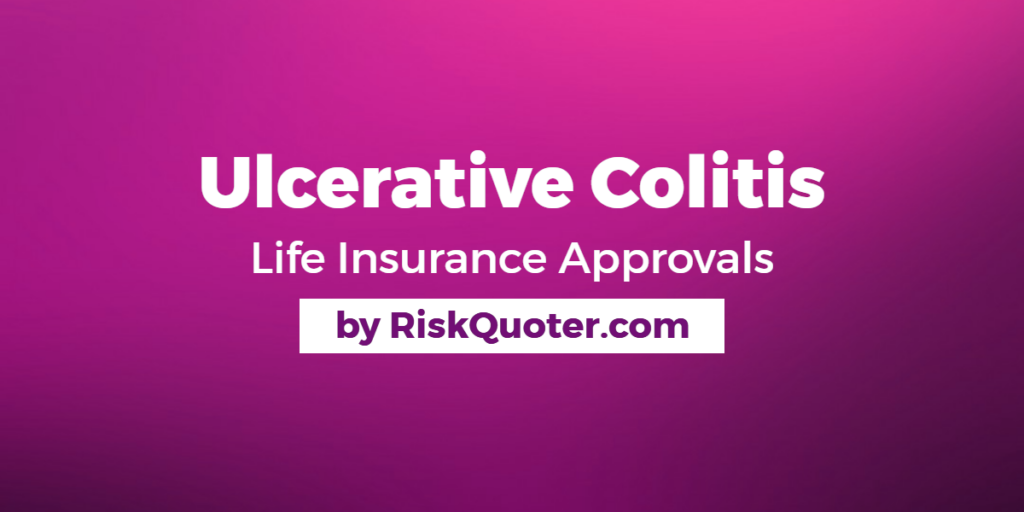Can you get life insurance if you have ulcerative colitis? Yes, absolutely. Even if you’ve been denied before, the right insurer can make all the difference.
This guide will walk you through the steps to find the best life insurance policies and insurance companies to help you get the financial protection you deserve, without the hassle.
What Is Ulcerative Colitis?
Ulcerative colitis is a type of inflammatory bowel disease (IBD) that causes inflammation and ulcers in the lining of the colon. It affects roughly 1 million Americans.
When applying for life insurance, underwriters evaluate:
- Severity of your condition (mild, moderate, or severe)
- Treatment and medication history
- Colonoscopy results
- Time since your last flare-up
- Other medical conditions – heart disease, diabetes, cancer history, etc.
How Ulcerative Colitis Affects Life Insurance
Ulcerative colitis is classified as mild, moderate, or severe. The extent of your inflammatory bowel disease (IBD) is a primary underwriting factor that life insurers consider.
The underwriting concern for ulcerative colitis and Crohn’s disease is the increased risk of developing colon cancer.
Mild Ulcerative Colitis
You may qualify for standard or even standard plus rates with:
- Adult-onset UC
- Mild inflammation is limited to the left side of the colon.
- Infrequent flare-ups.
- Intermittent rectal bleeding, intermittent diarrhea, and abdominal cramps.
- Medications limited to sulfasalazine, mesalamine, Asacol, Rowasa enemas, or cortenema.
- Medical marijuana use.
- Limited use of oral steroids during flare-ups.
- No anemia history.
- No skin, arthritis, or eye problems.
- No history of hepatitis.
- Good medical records and consistent follow-up.
Proctitis and proctosigmoiditis will follow the same life insurance underwriting as mild UC.
Moderate Ulcerative Colitis
Moderate ulcerative colitis follows the same symptoms as mild, but may also include:
- Mostly adult-onset.
- Left-sided or pancolitis (entire colon).
- More frequent flare-ups
- S
horter duration of time between flare-ups. - More severe symptoms of bleeding, diarrhea, and abdominal pain.
- Medications include Entyvio or injections with Humira and more frequent use of Prednisone.
- Possible hospitalizations.
- Anemia history
- Maintaining good medical records and following up with physicians.
Underwriters will review records, including all past flares, treatments, and colonoscopy results. Make sure you’re up to date with colonoscopies.
Severe Ulcerative Colitis
Most severe UC cases result in higher table ratings, postponements, or declines. Flat extras are not typically assigned to cases of ulcerative colitis.
Severe cases typically involve:
- Childhood-onset is common
- Frequent episodes with fever and heavy bleeding.
- Hospitalization & surgical treatment.
- Persistent symptoms after surgery.
- Unfavorable colonoscopy results indicate dysplasia.
- Weight loss greater than 10% of average body weight.
- Continuous use of steroid-based medications.
- Severe inflammation of the colon.
- Significant Anemia
Other factors affecting underwriting include liver function test results, if significantly elevated.
As a reference, the American College of Gastroenterology (ACG) has an activity index to determine IBD severity.
If term, universal, and whole life policies are not available, guaranteed issue life insurance may be the only option.
Diagnoses Considered to Be Uninsurable
The following are uninsurable for underwritten life insurance but may qualify for guaranteed issue policies:
- Fulminant ulcerative colitis
- Sclerosing cholangitis
- Pericholangitis.
What Underwriters Want to Know
Be ready to answer:
- When were you diagnosed?
- How many flare-ups in the past 6, 12, and 24 months?
- Have you ever been hospitalized for ulcerative colitis?
- What medications do you take and at what dosages?
- If you had to take steroids, what were the dates and dosages?
- Have you had surgery or been advised to?
- Any significant weight loss?
- Most recent colonoscopy date and results?
- Have you participated in clinical trials? Which ones and what was the outcome?
- Any other medical history like rheumatoid arthritis, kidney disease, breast cancer, or thyroid cancer?
Denied Due to Ulcerative Colitis?
If you were denied life insurance due to ulcerative colitis, don’t give up.
Many declines come from:
- Applying to the wrong life insurance company.
- Applying too soon after a flare-up.
- Applying for life insurance before completing all required medical follow-ups.
At RiskQuoter, we’ll shop your case to high-risk underwriters using a quick quote process, so you get real feedback before completing a full application.
Best Life Insurance Companies for Ulcerative Colitis
We’ve helped clients get approved with:
- Corebridge Financial (formerly AIG-American General)
- Banner Life
- John Hancock
- Prudential
- Lincoln National
- Principal
We shop your information out to 15+ companies for underwriting feedback, and will let you know which company is best for your health history in about 3 days.
Just Diagnosed with Ulcerative Colitis?
Expect a 3 – 6 month postponement before life insurance companies will offer coverage.
During this time:
- Take your medications as prescribed.
- Make sure the current colonoscopy results are available.
- Complete all follow-up visits with your physicians.
Common Mistakes That Hurt Your Approval Odds
- Skipping colonoscopies
- Applying during or shortly after a flare-up.
- Inconsistent treatment, not taking medications, etc.
- Trying to time life insurance with remissions
Life insurance companies will postpone coverage until the tests have been completed.
FAQ
Yes, especially if your condition is mild or moderate and you have stable medical records.
It can, depending on your medical history. Life insurers consider the severity of your UC, the frequency of flare-ups, your medication history, colonoscopy results, and your cancer screening history.
Corebridge Financial, Banner Life, John Hancock, and Prudential
Final Thoughts
You can absolutely get approved for life insurance with ulcerative colitis—many of our clients do.
The key is knowing which company to apply to and when. We’ll help you every step of the way.
No pressure. No obligation. Just accurate advice based on your unique health history.

